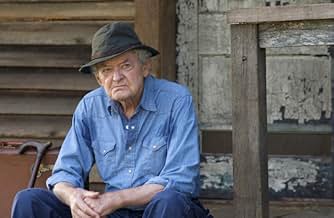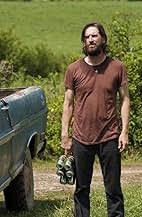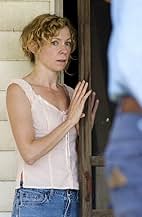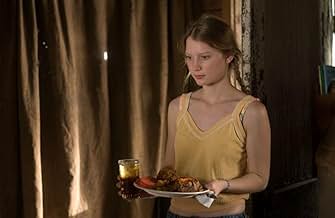IMDb-BEWERTUNG
7,0/10
3050
IHRE BEWERTUNG
Füge eine Handlung in deiner Sprache hinzuAn aging Tennessee farmer returns to his homestead and must confront a family betrayal, the reappearance of an old enemy, and the loss of his farm.An aging Tennessee farmer returns to his homestead and must confront a family betrayal, the reappearance of an old enemy, and the loss of his farm.An aging Tennessee farmer returns to his homestead and must confront a family betrayal, the reappearance of an old enemy, and the loss of his farm.
- Auszeichnungen
- 11 Gewinne & 4 Nominierungen insgesamt
Brian Edward Keith
- Deputy Keith
- (Nicht genannt)
William J. Mode
- Deputy Davies
- (Nicht genannt)
Empfohlene Bewertungen
In my opinion column, On San Diego, I offered a brief positive review of That Evening Sun after viewing it at the San Diego Film Festival. Those published comments are offered below.
"That Evening Sun," starring Hal Holbrook, shown on Sunday night to a packed house as the last film of the 2009 San Diego Film Festival. Now in his 80s, Holbrook gives a tremendous and subtle performance, as do all of the other actors in this Southern Gothic set in Tennessee: Walton Goggins, Mia Wasikowska, Carrie Preston and Ray McKinnon. With a screenplay written by Scott Teems, like fine red wine, well made and maintained, every character of the movie is developed and complex -- even the barking dog!
The tension between characters, circumstances and passions makes this film a rarity, genuinely gripping from scene to scene and unpredictable to the end. The sound track is beautiful and delicately augments the emotional tension as the film wonderfully plays against the painterly rustic sharecropper house interior, forest, sunset sky and fantastically grizzled faces of authentically rendered people pursuing their respective deep, heartfelt aspirations. Like a Henry James novella, the film is underlain with ambiguity and uncertainty, empathy and shifting sympathies that will provoke conversation; one might pronounce it a good "date movie," with something for both men and women. A gem, this film is the kind one may only see at a film festival.
San Diegans were lucky to be among the first to see the final cut of this fine work. Fortunately, come Thanksgiving time, 2009, "That Evening Sun" will be seen in limited release in Los Angeles and New York theatres. Perchance it will also return to San Diego?
"That Evening Sun," starring Hal Holbrook, shown on Sunday night to a packed house as the last film of the 2009 San Diego Film Festival. Now in his 80s, Holbrook gives a tremendous and subtle performance, as do all of the other actors in this Southern Gothic set in Tennessee: Walton Goggins, Mia Wasikowska, Carrie Preston and Ray McKinnon. With a screenplay written by Scott Teems, like fine red wine, well made and maintained, every character of the movie is developed and complex -- even the barking dog!
The tension between characters, circumstances and passions makes this film a rarity, genuinely gripping from scene to scene and unpredictable to the end. The sound track is beautiful and delicately augments the emotional tension as the film wonderfully plays against the painterly rustic sharecropper house interior, forest, sunset sky and fantastically grizzled faces of authentically rendered people pursuing their respective deep, heartfelt aspirations. Like a Henry James novella, the film is underlain with ambiguity and uncertainty, empathy and shifting sympathies that will provoke conversation; one might pronounce it a good "date movie," with something for both men and women. A gem, this film is the kind one may only see at a film festival.
San Diegans were lucky to be among the first to see the final cut of this fine work. Fortunately, come Thanksgiving time, 2009, "That Evening Sun" will be seen in limited release in Los Angeles and New York theatres. Perchance it will also return to San Diego?
Based on the short story "I Hate to See That Evening Sun Go Down" by William Gay, "That Evening Sun" presents us with an epic battle of wills between two equally immutable forces fighting over the same piece of land. The property in question is a rundown farm in rural Tennessee owned by Abner Meecham (Hal Holbrooke), an octogenarian who's just walked away from the retirement home his son (Walter Goggins) placed him in after a serious fall a few months back. When Abner gets back to his farm, he is stunned to find that - thanks to a deal brokered by his lawyer son – the place has been signed over to a white-trash, ne'er-do-well by the name of Lonzo Choat (Ray McKinnon), who now lives there with his wife (Carrie Preston) and sixteen-year-old daughter (Mia Wasikowska), with whom Abner establishes an uneasy but generally tender relationship.
Scott Teem's screenplay is multi-faceted and complex in the way it develops its characters. For instance, many of the very same qualities that make Abner so appealing to the audience – his tenacity, his commitment to principle, his uncompromising willingness to call things as he sees them – are also what make him a hard person to deal with for those who are actually a part of his life. This is especially the case with his son, who though he obviously loves his father and wants to do right by him, harbors a lifelong resentment against the old man for his harsh treatment of both himself and his now-deceased mother while he was growing up.
To a somewhat lesser extent, Lonzo is also portrayed in a three-dimensional light. Though he is an alcoholic, a wastrel, and a man prone to acts of violence against both animals and members of his own family, there is a sense that he is genuinely trying to get his life together by earning an honest living and finally being a decent provider for his loved ones.
The movie really seems to understand the tragedy of old age – of feeling as if everything you ever called your own is now being taken away from you and nobody around you seems to care. In fact, many of those people – despite, in some cases, their possible good intentions - are proactively involved in bringing that outcome about. The movie also touches upon that root and highly American value of property ownership, and the willingness to stop at virtually nothing to ensure one's hold on one's land.
"That Evening Sun" is what is called in the trade an "actors' picture," and, indeed, it is the performances that are of primary interest here. Holbrooke has always been a tremendous actor, but here he is positively transcendent as Abner, a crusty old coot who is so much more than just a crusty old coot. Goggins, the brilliant star of "The Shield" and "Justified" and a co-producer of this film, is also excellent as Paul Meecham, a role quite different from the ones in the aforementioned works. And McKinnon, Preston ("True Blood"), and Wasikowska ("Alice in Wonderland," "The Kids are All Right") are all wonderful as well.
The tone of the film is contemplative and muted, and Teems' direction is rich in atmosphere and setting.
Scott Teem's screenplay is multi-faceted and complex in the way it develops its characters. For instance, many of the very same qualities that make Abner so appealing to the audience – his tenacity, his commitment to principle, his uncompromising willingness to call things as he sees them – are also what make him a hard person to deal with for those who are actually a part of his life. This is especially the case with his son, who though he obviously loves his father and wants to do right by him, harbors a lifelong resentment against the old man for his harsh treatment of both himself and his now-deceased mother while he was growing up.
To a somewhat lesser extent, Lonzo is also portrayed in a three-dimensional light. Though he is an alcoholic, a wastrel, and a man prone to acts of violence against both animals and members of his own family, there is a sense that he is genuinely trying to get his life together by earning an honest living and finally being a decent provider for his loved ones.
The movie really seems to understand the tragedy of old age – of feeling as if everything you ever called your own is now being taken away from you and nobody around you seems to care. In fact, many of those people – despite, in some cases, their possible good intentions - are proactively involved in bringing that outcome about. The movie also touches upon that root and highly American value of property ownership, and the willingness to stop at virtually nothing to ensure one's hold on one's land.
"That Evening Sun" is what is called in the trade an "actors' picture," and, indeed, it is the performances that are of primary interest here. Holbrooke has always been a tremendous actor, but here he is positively transcendent as Abner, a crusty old coot who is so much more than just a crusty old coot. Goggins, the brilliant star of "The Shield" and "Justified" and a co-producer of this film, is also excellent as Paul Meecham, a role quite different from the ones in the aforementioned works. And McKinnon, Preston ("True Blood"), and Wasikowska ("Alice in Wonderland," "The Kids are All Right") are all wonderful as well.
The tone of the film is contemplative and muted, and Teems' direction is rich in atmosphere and setting.
I've been looking forward to "That Evening Sun" for a while now, and not just because it was shot in the county and surrounding towns where I live here in Tennessee.
My anticipation was largely because of Hal Holbrook, an iconic performer I have seen in his one-man "Mark Twain Tonight!" stage show, and who appears in occasional guest shots on TV where things must move very fast, and less often in film, where things are allowed to proceed at a more measured pace.
I was not disappointed, the character study of Abner Meechum, the refugee from an old folks' home and renegade on his own property is rich, complex, and satisfying throughout. Admittedly it may not be a big stretch for Holbrook to play a cranky 80-year-old, but that doesn't lessen the impact of the performance at all.
Surrounding him is a cast of surprisingly strong players: the antagonist Lonzo Choat (Ray McKinnon) is an especially worthy and believable opponent, and supporting cast Pamela and Ludie Choat (Mia Wasikowska and Carrie Preston) likewise hit just the right notes, tugging this farm county family drama at precisely the right pace. I especially enjoyed Barry Corkin, perfect in the Wilfred Brimley-esquire good neighbor role, and a special mention for the cameo by Dixie Carter, Hal Holbrook's wife in the movie as well as in real life.
Where I saw the film, at a packed 1pm matinée, the audience laughed at several of the moments, self-reflective as they were of Tennessee rural life. I don't know that they would garner that kind of introspective appreciation in other parts of the country, but here, people know their country folk and can laugh with, rather than at them.
"That Evening Sun" is a simple yarn: Abner tires of life in a retirement home and returns to the farm he and his deceased wife occupied for most of their lives, only to find it occupied by a neer-do-well, but one with a property lease Abner's "guardian son" has approved. The story is more than the tug-of-war between owner and lessor, it is between hard-working- older and layabout younger, and between lives at noon and the sundown that inevitably follows. Taken from William Gay's short stories of Southern life, "I Hate To See That Evening Sun Go Down," it's the unraveling of a proud man in the twilight, as his own sun is setting, and his fight with the oncoming night.
Hal Holbrook is a treasure. So is this film. It's Indie with a capital "I", an armful of festival awards, and, one hopes, a long run ahead.
My anticipation was largely because of Hal Holbrook, an iconic performer I have seen in his one-man "Mark Twain Tonight!" stage show, and who appears in occasional guest shots on TV where things must move very fast, and less often in film, where things are allowed to proceed at a more measured pace.
I was not disappointed, the character study of Abner Meechum, the refugee from an old folks' home and renegade on his own property is rich, complex, and satisfying throughout. Admittedly it may not be a big stretch for Holbrook to play a cranky 80-year-old, but that doesn't lessen the impact of the performance at all.
Surrounding him is a cast of surprisingly strong players: the antagonist Lonzo Choat (Ray McKinnon) is an especially worthy and believable opponent, and supporting cast Pamela and Ludie Choat (Mia Wasikowska and Carrie Preston) likewise hit just the right notes, tugging this farm county family drama at precisely the right pace. I especially enjoyed Barry Corkin, perfect in the Wilfred Brimley-esquire good neighbor role, and a special mention for the cameo by Dixie Carter, Hal Holbrook's wife in the movie as well as in real life.
Where I saw the film, at a packed 1pm matinée, the audience laughed at several of the moments, self-reflective as they were of Tennessee rural life. I don't know that they would garner that kind of introspective appreciation in other parts of the country, but here, people know their country folk and can laugh with, rather than at them.
"That Evening Sun" is a simple yarn: Abner tires of life in a retirement home and returns to the farm he and his deceased wife occupied for most of their lives, only to find it occupied by a neer-do-well, but one with a property lease Abner's "guardian son" has approved. The story is more than the tug-of-war between owner and lessor, it is between hard-working- older and layabout younger, and between lives at noon and the sundown that inevitably follows. Taken from William Gay's short stories of Southern life, "I Hate To See That Evening Sun Go Down," it's the unraveling of a proud man in the twilight, as his own sun is setting, and his fight with the oncoming night.
Hal Holbrook is a treasure. So is this film. It's Indie with a capital "I", an armful of festival awards, and, one hopes, a long run ahead.
Abner Meecham,who has been living in a nursing home,is unhappy & wants to live out his final days on the farm land where he had made his living for over 50 years. One day,he packs his things & just walks away from it all. Despite a first failure (where he is picked up by the police & returned back to the home),Abner,undaunted tries again,this time getting further,with the help of a taxi cab driver,to his old farm land. Problem is,the land & the house are now leased by Lonzo Choat,who Abner doesn't like,one bit. Abner takes up in the workers quarters,just off the main house,much to the chagrin of Lonzo, who wants Abner off of his property,a.s.a.p. The following makes for a tense tale,that you know is going to end up badly. Scott Teem ('A Death In The Woods','Roots') directs & writes the screenplay,adapted from the novel, 'I Hate To See The Evening Sun Go Down',by William Gay (the title of which is taken from a line in an old country blues song by Jimmy Rogers). This is a quiet little independent film that in the wrong hands would have turned out to be just another Southern exploitation film (like the kind of films produced by Harry Novak that used to play drive in's back in the 1970's that stereotyped all of the citizens of the South as back woods,slack jawed,inbred,boozing,village idiots that would have sex with farm animals,or family members,or all of the above),but rises above that. The great Hal Holbrook (forever known for his portrayal of Mark Twain on stage & screen)plays Abner,a man who just wants what is rightly his. Ray McKinnon is Lonzo,a man who is just dripping with contempt for Abner. The rest of the cast (unknown by yours truly)turn in shining roles on screen. This is a quiet,little "indie" that drew acclaim at the festivals,but probably won't get much in the way of main steam distribution (I got to see it at one of our cinemas that specializes in foreign & art films),but deserves better. Rated PG-13 by the MPAA,it contains some raunchy language,an unpleasant scene of domestic abuse & some minor adult content.
This movie came from nowhere for me here in Australa. Its a little middle-American indie film that I had never heard of until I saw it advertised on my upcoming orders list. I just finished watching it and it is a fantastic character study. It stars Hal Holbrook in one of the finest performances in his long and successful career. He plays an old man who walks out of his nursing-home and returns to the farm he owned for over 50 years only to find it occupied by new tenants. Being stubborn he squats in the old worker's quarters and wages a personal war against the new family. From there the film becomes a real examination of this old man's mind. He is at the narrow end of life and has nothing to show for it. Everything he knew was taken away and he is doomed to live the rest of his life with regret about many things in his life. Unbeknownst to him, much of his traits are reflected in his newly appointed enemy. Its a slow drama with moments of tension. The performances are exceptional and the relationship he has with his old neighbour is wonderful (some of the best scenes). Well worth a look.
Wusstest du schon
- WissenswertesDixie Carter's final film appearance.
- Zitate
Abner Meecham: Ha! Folks in hell will be eating Eskimo Pies before Lonzo Choat hauls me anywhere.
Top-Auswahl
Melde dich zum Bewerten an und greife auf die Watchlist für personalisierte Empfehlungen zu.
- How long is That Evening Sun?Powered by Alexa
Details
- Erscheinungsdatum
- Herkunftsland
- Offizieller Standort
- Sprache
- Auch bekannt als
- I Hate to See That Evening Sun Go Down
- Drehorte
- Produktionsfirmen
- Weitere beteiligte Unternehmen bei IMDbPro anzeigen
Box Office
- Bruttoertrag in den USA und Kanada
- 281.350 $
- Eröffnungswochenende in den USA und in Kanada
- 7.330 $
- 8. Nov. 2009
- Weltweiter Bruttoertrag
- 281.350 $
- Laufzeit1 Stunde 49 Minuten
- Farbe
- Sound-Mix
- Seitenverhältnis
- 2.35 : 1
Zu dieser Seite beitragen
Bearbeitung vorschlagen oder fehlenden Inhalt hinzufügen

Oberste Lücke
By what name was That Evening Sun (2009) officially released in India in English?
Antwort






























